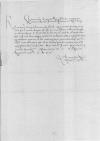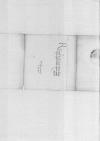Letter #5698
Sigismund I Jagiellon to Ioannes DANTISCUSCracow, 1539-12-02
| received 1540-01-29 Manuscript sources:
Prints:
| ||||||||
Text & apparatus & commentaryPlain textText & commentaryText & apparatus
Reverendo in Christo Patri, domino
Reverende in Christo Pater, sincere nobis dilecte.
Queruntur
Bene valeat Paternitas Vestra.
Dat(ae) or Dat(um)⌈Dat(ae)Dat(ae) or Dat(um)⌉
Ad mandatum regiae maiestatis proprium


 AGAD, AZ, 2999, f. 175v
AGAD, AZ, 2999, f. 175v